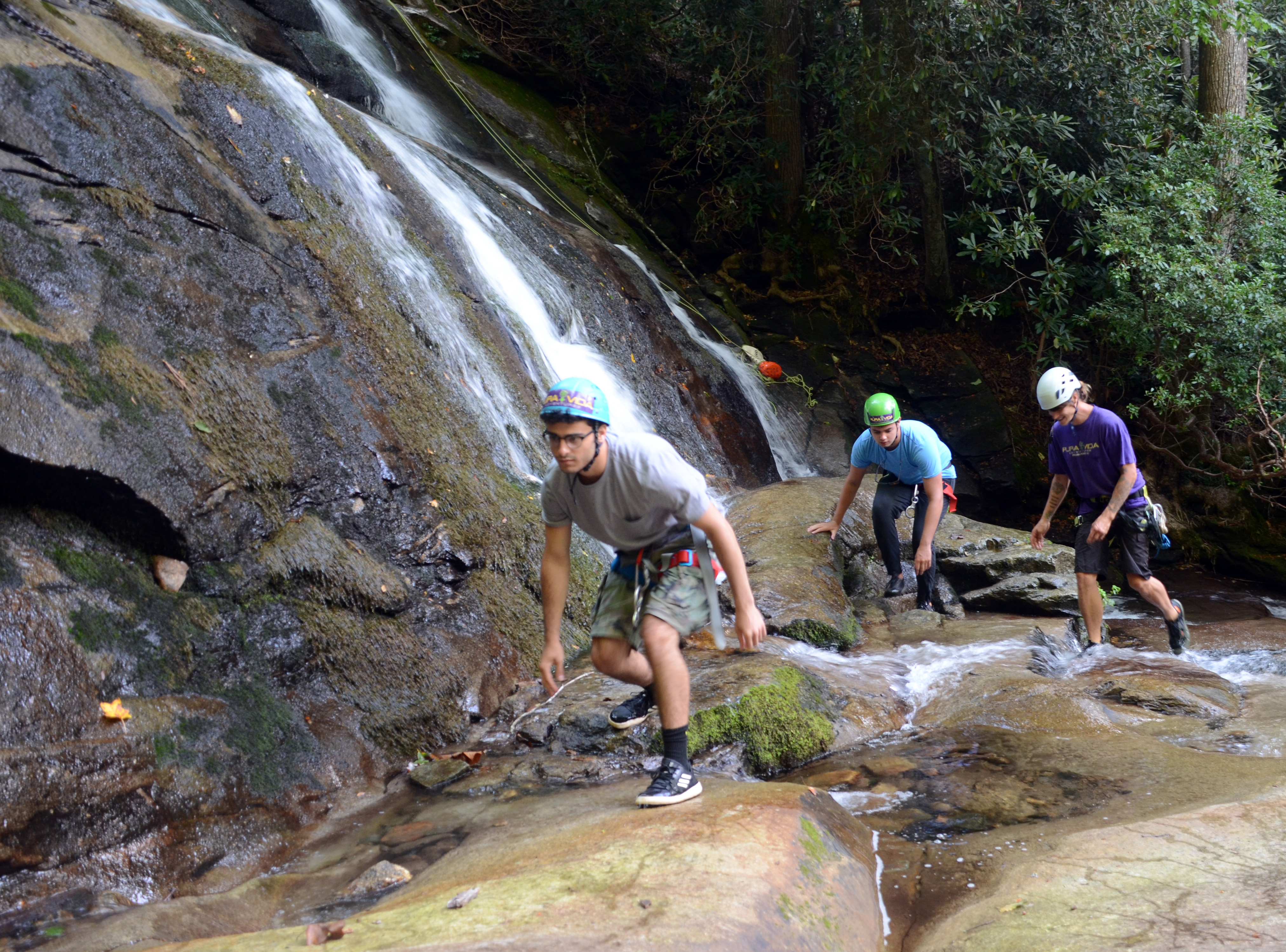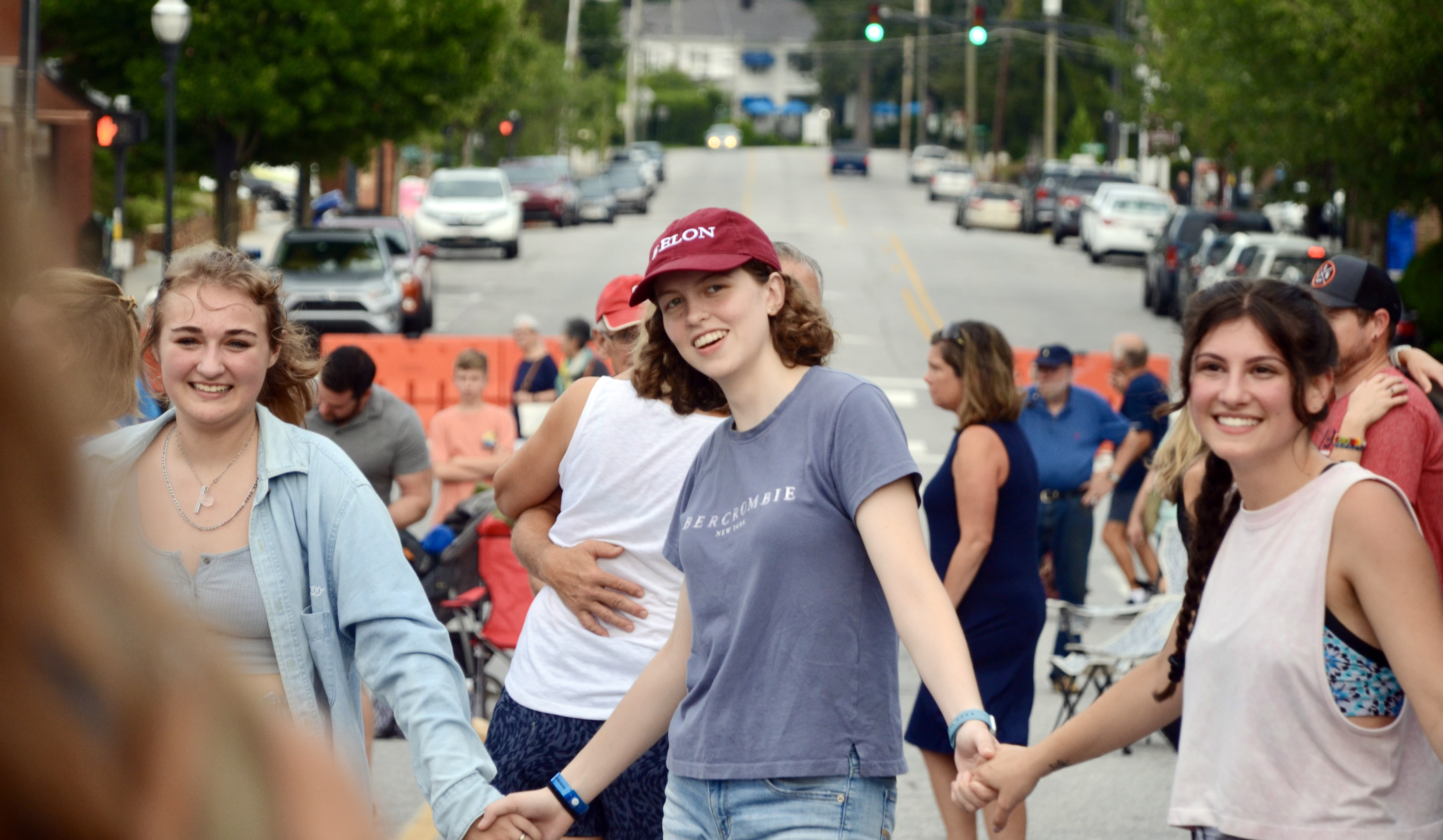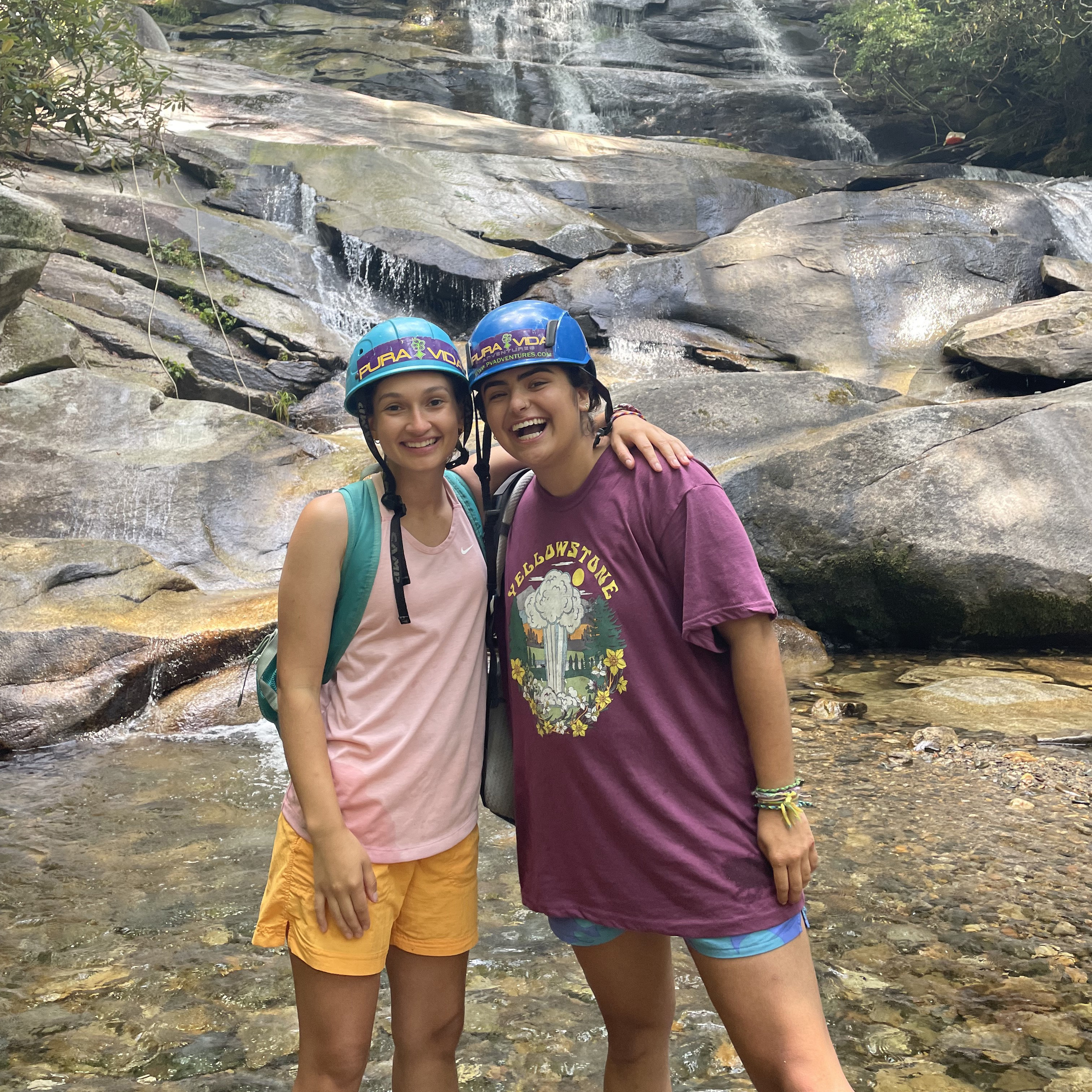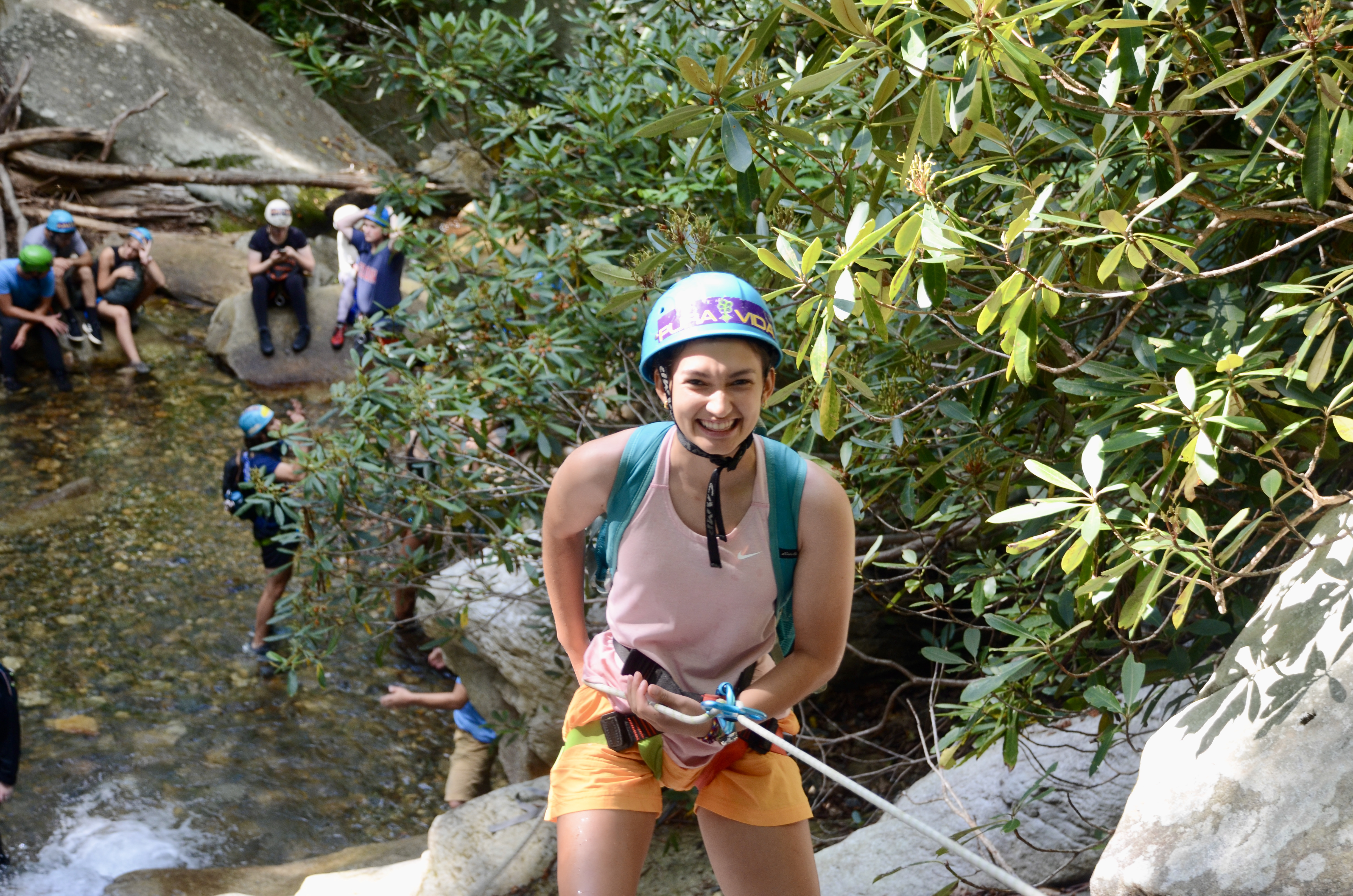Adventures in Leadership sessions focus on the successful transition of incoming first-year students through community building, finding resources and having conversations about college life and Elon.
Air conditioning, cell phone service and a bed — all the comforts of home that 24 incoming first-year students left behind when they took part in the Adventures in Leadership (AIL) whitewater rafting and rock-climbing session this summer.
The whitewater rafting and rock-climbing session was one of six held this July across North Carolina for members of Elon’s Class of 2026, from paddling on the Outer Banks to a local adventure in Alamance County, all the way to Pisgah National Forest in Western North Carolina.

For some of the 150 participants this summer, it was a reunion to the outdoors, a rhythm with nature that they are familiar with. Calista Quirk ‘26, from Potomac Falls, Virginia said it was a dream come true. “If I can do anything outdoor-related before I start school, I want to do it,” said Quirk, who will be an Outdoor Leadership Education major in the fall.
For others, it was a daunting task to sleep in tents, not have cell service and spend the days in the sun hiking. But for all, they did one hard thing after another in preparation for Move-In Day at Elon on Friday, Aug. 19.
Of course, there were those in the middle of those two camps — the ones who liked doing outdoorsy things but haven’t had the opportunity. “I don’t do enough outdoorsy stuff, and yet I love outdoorsy stuff,” said Michael Bilardello ’26.
“I think that introducing people to the outdoors is such a wonderful thing because I did not grow up in an outdoorsy family,” said Juliana Schiano ’23, a student facilitator for AIL, “So I thought that Adventures in Leadership was such a great program because it exposed people to a way to get to know the outdoors in a way that was accessible.”
Schiano, along with 17 fellow student staff members, spent three weeks all across North Carolina, from the Outer Banks on the coast to Brevard in the mountains. AIL is student-run, with a faculty advisor offering support during the sessions. Student coordinators, who are the supervisors during the sessions, float around and make sure everything is running smoothly. They spent the spring semester planning and organizing these sessions, working with vendors, planning logistics and, of course, planning meals. And there are student facilitators, who work closely with the participants, guide conversations about the transition to Elon and become mentors.
“It was amazing to watch the connections form throughout the week between facilitators and participants,” said Mandi Jaffe ’24, a student coordinator from Parkland, Florida. “Being a resource for facilitators and being there to support them was a rewarding job.”
Participants in the rafting and rock-climbing session arrived at Elon on a Sunday. They took on the ropes courses on Elon Challenge to help build trust and relationships and afterward participated in a leadership workshop that included learning the difference between how to lead and how to be a leader and how to get involved at Elon on day one.
On Monday they took a tour of Elon before taking the three-and-a-half-hour drive to Pisgah National Forest in western North Carolina.
Tuesday was the main event for most participants — whitewater rafting. The group took to the water, learned basics and were off. By the end of the day, the group was exhausted from fun, water and smiling.
From the river they headed to downtown Brevard for the town’s weekly square dancing event, which is made into the schedule each year for this session.

Student leaders ran into the center of the street for square dancing. They grabbed the hands of students and called their names to join the fun. After a day of whitewater rafting, this was a way to wake everyone, give them a second wind. and bring smiles to their faces.
The sun set on the way back to camp. While both participants and facilitators were tired from the day’s activities, they still met in their small groups to talk about the day. In the glow of headlamps strapped to water bottles, the discussion moved around in the circle with each student sharing their rose, their thorn and their bud – their highs and lows of the day, and what they are looking forward to tomorrow.
While going around the circle someone said that the square dancing was their rose — that it was type one fun. In Outdoor Leadership and Education, they break down fun into three types. Type one is fun at the moment and fun in memories. Type two is not fun at the moment but when you look back it will be a good memory. Type three is a positive spin on a bad experience — it will never be fun.
Most in the circle said their rose was whitewater rafting or dancing in the street and they were most looking forward to canyoneering the next day. Facilitators broke down what the next day would look like, when they needed to hit the road, and what to wear and expect from canyoneering.
Wednesday had an early start with vans loaded and ready to leave at 7 a.m. Two of the four vans headed into Pisgah National Forest to meet their guides for the day. Students were given a helmet, harness and specific canyoneering shoes. The group hiked through the woods to the top of a waterfall. There, the guides explained the technique and had everyone practice rappelling before giving it a shot on the waterfall.
As golden hour approached and coordinators started cooking for everyone, Carol Smith, professor of education and wellness and the faculty advisor for the session, took the participants and facilitators to a clearing for the faculty talk. She and the student facilitators offered insights into what to expect when classes start, practical advice about notebooks and technology and the library.
Facilitators reminisced about their first weeks at Elon as new students and how challenging the transition can be. But they also gave advice and perspective on the upcoming move-in. “You spent all week doing scary stuff. Transitions are scary. But this is a temporary period of a temporary time,” said Schiano.

The student-run nature of AIL is one of the main factors in helping participants in their transition to Elon in the fall. As Evan Small, assistant director of campus recreation and wellness for experiential learning and outdoor adventures and instructor in the department of education and wellness, described it, “I believe that those who are best equipped to plan it are current students who can remember what it felt like to be an incoming student and to be new at Elon. The participants can form relationships with other incoming students and with upperclassmen facilitators who often continue their mentoring relationship well into the fall semester.”
It was clear that participants made those connections with one another and the student staff while asking questions about what to expect in a couple of short weeks. They felt comfortable asking those questions, about being honest about how they were feeling about this new chapter in their lives.
“I care about the participants and want them to see me as a friend who just happens to have gone through some more things than they have and I want to use that knowledge to make them more comfortable being uncomfortable,” said Sam Goldberg ’23 a facilitator from Sandwich, Massachusetts.
It was in the breaks and the downtime that those connections flourished as they shared about what their majors would be, what their goals at Elon might look like and their hometowns.
And while everyone’s favorite activity during the week was whitewater rafting, that wasn’t the answer everyone gave when asked about their favorite part of the week.
“My favorite part has been seeing the group grow and my stepping out of my little shell a little bit and be able to make friends and memories,” Quirk said.
Quirk was one of the participants who was ready for the week outside, and she pushed herself outside her comfort zone to meet new people. That’s what makes these sessions so important — they push participants in one way or another. If it isn’t the adventure activities, it’s the meeting new people, but overall, it’s getting participants out of their comfort zones.
“It shows them that they have grit and they are stronger than they thought they were which gives them a good mindset going into their first year of college,” said Goldberg.



